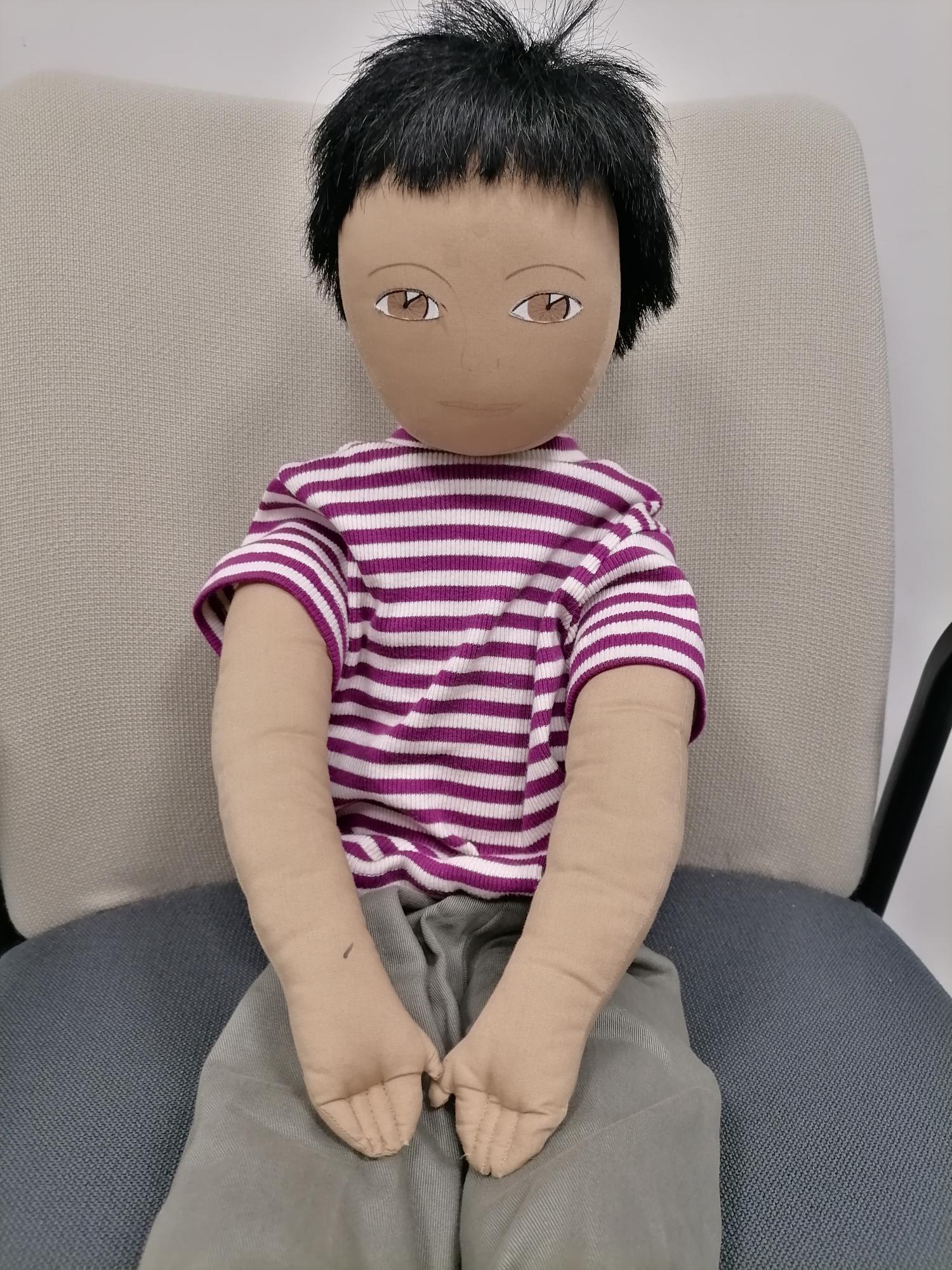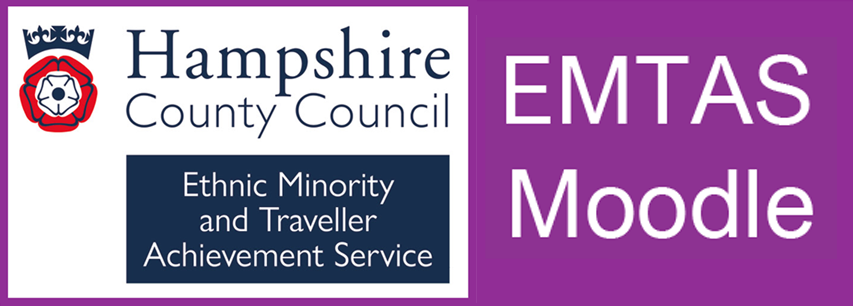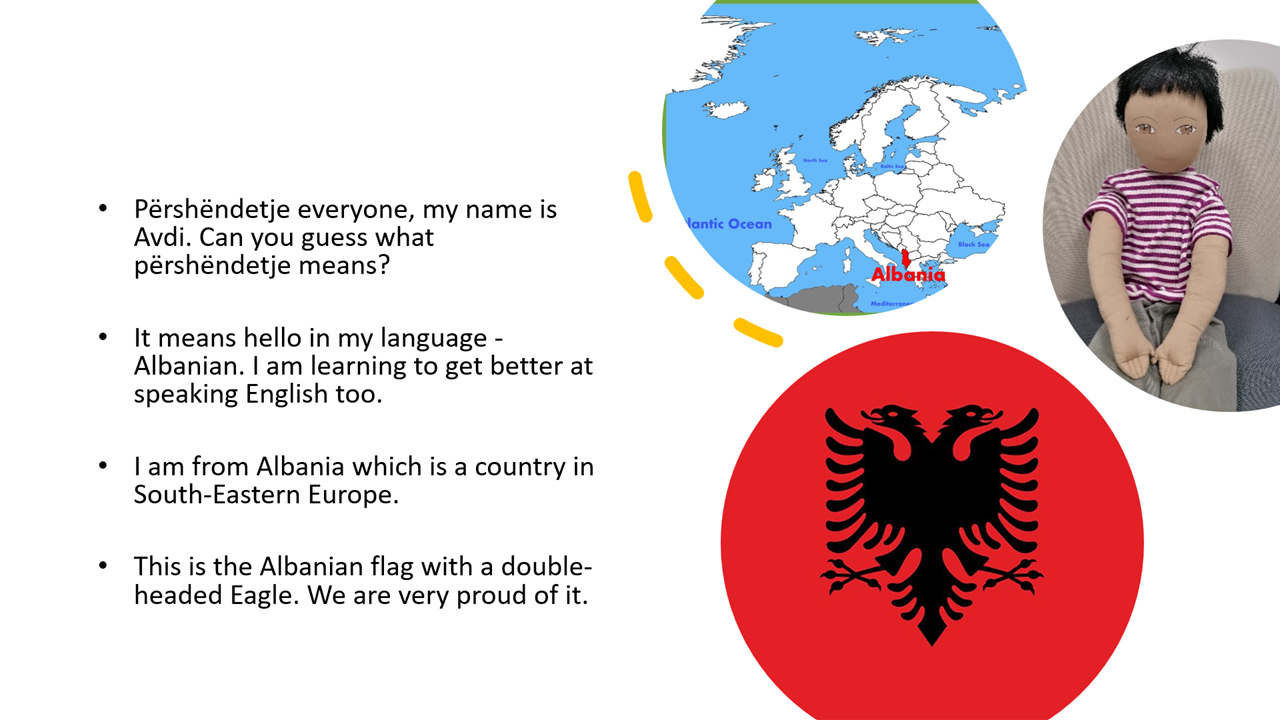Blog entry by Astrid Dinneen
By Hampshire EMTAS Specialist Teacher Advisor Kate Grant
In this blog, Kate Grant interviews Albanian born Persona Doll Avdi. She asks how practitioners can work with EMTAS Persona Dolls to engage young learners with topics such as diversity, culture and stereotypes.
The Persona Dolls approach affords children an engaging, enjoyable and interactive safe space where they can address challenging issues, share their lived experiences and have their voices heard and valued. It helps our youngest learners to develop their emotional literacy and empowers children to use their voice. The approach is designed to facilitate dialogue around bias and stereotypes which so many of our youngest learners will have already encountered.
If you have used EMTAS Persona Dolls previously you will have noticed that they have been taking a well-deserved rest. After all, it’s not easy visiting lots of schools and making friends all over the county - just ask Avdi! Whilst the dolls have been relaxing, Kate has been working behind the scenes on making the use of EMTAS Persona Dolls in school more accessible, relevant and most of all fun. So without further ado please welcome Avdi to tell us more…

Avdi: Përshëndetje (hello) everyone, my name is Avdi and I am from Albania. Kate has asked me to share with you how working with Persona Dolls can help support your youngest learners in school. This is the perfect topic for me to talk about as I have been a Persona Doll my whole life!
Kate: What do you like about being a Persona Doll?
Avdi: One of the main things I love about being a Persona Doll is that I get to travel around the county, meeting lots of children and learning about different schools. I am always amazed by how warmly the children welcome me into their classroom - they sometimes even give me a school uniform to wear. But most of all, I love hearing the brilliant things children say when I go to visit their school and it often surprises their teachers too as we delve into conversations about issues they might not ordinarily get to discuss such as discrimination and inequality. Big topics for our youngest minds.
Kate: How do you support the children?
Avdi: I find that the children see me as being just like
them. This helps create a safe environment where they are happy to share and
talk about aspects of life they may not normally get to discuss. I think of it as providing children with a
window into someone else’s life, but they often find aspects that mirror their
own too. That’s what life is all about, learning
about yourself and others and embracing the similarities as well as the
differences.
Kate: How will teachers find time to use Persona Dolls?
Avdi: We work within the Early Years Foundation Stage and Key Stage 1/2 curriculum, so we are not an add-on. In fact we’re a different approach to teaching Personal, Social, Emotional Development, Knowledge and Understanding of The World and Relationships and Sex Education. Kate has linked all the relevant parts of the curriculum with our guidance documents so that teachers can see the objectives they can cover whilst working with us. For example you will see we provide an authentic way to approach the People, Culture and Communities element of the Early Years Foundation Stage curriculum [1] and the Respectful Relationships aspect of the Key Stage 1/2 curriculum [2].
Kate: What happens when you visit schools?
Avdi: I normally visit once a week for a half term. When I first go into a school, I explain that I am feeling a bit nervous about being somewhere new with people I don’t know yet, and the children discuss how they could help make me feel more comfortable. It’s lovely to hear how kind the children are and accepting of new people - I wish people were always like this. The next week when I return, I am more confident so I let their teacher share a PowerPoint I have made to tell them a bit more about myself, my home, my language and my interests. The children always want to tell me about themselves too and we find similarities and differences with each other.
By week 3 I am really enjoying being with my new group of friends and I share that something has been worrying me. For example, another child has been unkind to me because my hair is different to theirs. The teacher helps me talk to the children and they respond with so much empathy. A lot of the time, the children tell me they have experienced similar things and we talk about what helped them eg speaking to an adult at school. My new friends always give me good advice, so I go away and try some of their ideas. When I return for my final visit, I feel so much better because they supported me. I explain that I must return to my school again and might not see them, but we will still be friends. I like to surprise them with an e-postcard after my final visit. This shows I am still thinking of them and gives me an opportunity to ask them to write to me about our time together.
Kate: What is different about the way EMTAS Persona Dolls work now?
Avdi: Kate is working on making everything available online because we know how busy teachers are and we want everything to be readily accessible in the moment. Once everything is ready to go, it will all be uploaded to our Moodle where you will find the guidance documents, a list of all our Persona Dolls, suggestions for what to do during each visit and some social stories for teachers.
When I visit your school I will have a lanyard with a QR code so that teachers can find what they need instantly. When teachers share the Persona Doll’s PowerPoint it will contain video links to find out more about the culture and language(s) of the doll’s country of origin together with traditional dances and nursery rhymes in first language.
Kate: Is there anything else you want to tell everyone?
Avdi: Just that I am really excited to get back into schools and to meet lots of new friends. Oh, and if any schools would like to pilot our revamped way of working please email Kate at kate.grant@hants.gov.uk.
[1] Explain some similarities and differences between life in this country and life in other countries
[2] The importance of respecting others, even when they are very different from them (for example, physically, in character, personality or backgrounds), or make different choices or have different preferences or beliefs.

